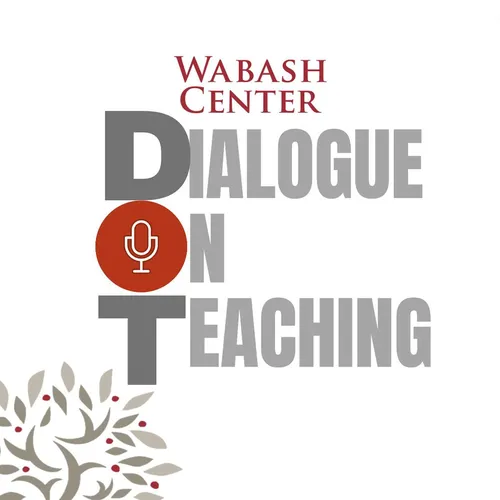
The Wabash Center's Dialogue On Teaching
Dialogue on Teaching, hosted by Nancy Lynne Westfield, PhD, is the podcast of The Wabash Center for Teaching and Learning in Theology and Religion. Amplifying the Wabash Center’s mission, the podcast focuses upon issues of teaching and learning in theology and religion within colleges, universities and seminaries. The podcast series features dialogues with faculty teaching in a wide range of institutional contexts. The conversations will illumine the teaching life.
Host: Nancy Lynne Westfield, PhD
Producer: Rachel Mills
Sound Engineer: Paul O. Myhre, PhD & Paul Utterback
Podcast music by Dr. Paul O. Myhre, PhD
- Update frequency
- every 6 days
- Average duration
- 35 minutes
- Episodes
- 320
- Years Active
- 2020 - 2025

Episode 176 - Welcoming Early Career Colleagues: Sarah Farmer
How you enter a place, a job, a career is important. Processes of interviewing, hiring, onboarding inform concerning belonging or lack of belonging of the community.
How does a faculty inform a newly…

Episode 175 - Family/Work Balance & Race Identity: Bryson White
What does it mean when the messiness of our humanness and family relationships is precisely what makes us better teachers? The courage to be vulnerable and act as a learner with our students can be i…

Episode 174 - Not What I Thought It Would Be: Marsha Foster
What happens when the teaching life is a grind? How does one manage the institutional pressures of academic life?
Without mentoring how do I know if I might be a good administrator? What does it take …

Episode 173 - Teaching as Catching: Shively T. J. Smith
What can be taught and what must be caught? What does it take to choreograph student discovery, detection, encounter, experience, stumbling upon, and notice of the unexpected?
What practices allow tea…

Episode 172 - Motherhood and Teaching: Ekaterina Lomperis, Lakisha Lockhart, and Sarah Farmer
So often scholarship is mired in a narrative of guilt for women who choose the mother. Too often mothering is thought to be a squandering of time for those pursuing tenure or promotion. What does it …

Episode 171 - Toward Discovery and Curiosity: Amy Oden
Creating classrooms where learners have agency, trust, and are encouraged to bring their own knowledge to bear upon the conversation is challenging but possible.
What does it mean to craft learning ac…

Episode 170 - Effective Leadership Now: Dan Aleshire
New patterns of institutional power, new visions, and the capacity to make unpopular decisions still does not guarantee successful leaders.
In this current wilderness experience, how are leaders train…

Episode 111 - Taking Play Seriously: Lakisha R. Lockhart
Play, with and for adult learners, recognizes embodied aesthetics, assists in meaning making, redefines productivity, and welcomes wisdom. Diversities of epistemologies through play pedagogies enhanc…

Episode 115 - Dare to Pursue Passion: Ralph Basui Watkins
Centering creativity in knowledge production and teaching. The best scholarship comes from animating our ideas, refusing to be policed, nurturing curiosity, and pursuing a spirit of play. We all need…

Episode 133 - Mothering in the Academy: Dangerous, Shameful, and Common Place: Lakisha Lockhart, Sarah Farmer, and Ekaterina Lomperis
The measures of scholarly productivity are often premised upon a life without the distractions of children and family. The challenges of tenure and promotion are amplified for young parents, yet scho…

Episode 156 - Intercultural Dynamics: Anne Carter Walker
The racial/cultural identity of teachers contributes to the formation, influence and dynamics of student learning. Given the climate of the national discourse on issues of race, racism, inclusion, an…

Episode 163 - Teaching in Precarious Time: Courtney Bryant
Spring of 2022 is proving to be a difficult semester. Increasingly, students exemplify behaviors of distress. Faculty are ill-equipped to meet needs of strained students while they themselves are str…

Episode 169 - Depending Upon Inherited Knowledges: Gina A. S. Robinson
Doctoral students were challenged to the brink to remain in school during the pandemics. The chaos of closed libraries, restructured exams, and isolation might have foreclosed on some students. Hear …

Episode 168 - Notes of a Native Daughter: Keri Day
The narrative of decline concerning theological education is better met with a narrative of complex opportunity. Now is the time, even in liminality and contradiction, to consider pedagogical pivots …

Episode 167 - Relationship Between Church and Theological Education: Dan Aleshire
Does the church want theologically educated leadership? What kind of learning is needed now for effective ministry? In what ways can the seminary benefit from the knowledge production of the church? …

Episode 166 - Starting from Scratch: Steed Vernyl Davidson
Who has the boldness to reinvent (rather than adapt) the seminary? What kinds of spaces will be needed for the learning experience? Perhaps, we need assistance from artists who are world builders and…

Episode 165 - Transforming Fire: Mark Jordan
What do we ask our students to risk when we refuse the pretentions of expertise? What if the uncanny things which occur in our classrooms are the refiner’s fire changing us, student and teacher alike…

Episode 164 - Accreditation? What? Why?: Dan Aleshire
Demystifying the voluntary, non-voluntary, peer process. How do you know when good decisions are made and how blunders are corrected? What about learning outcomes? Before joining a faculty, read the …

Episode 162 - Community Thriving: Debra Mumford
The institutional step after grappling to become anti-racist is to move toward communal thriving. A sign of hope, impact and accomplishment is when students hold faculty and administration accountabl…

Episode 161 - Teaching as Inclusion: William Yoo
Classroom lessons cannot be reduced to benign, disembodied facts. Teaching must acknowledge cultural complexity, the lack of truth telling and embrace the trouble likely to be stirred up in and beyon…